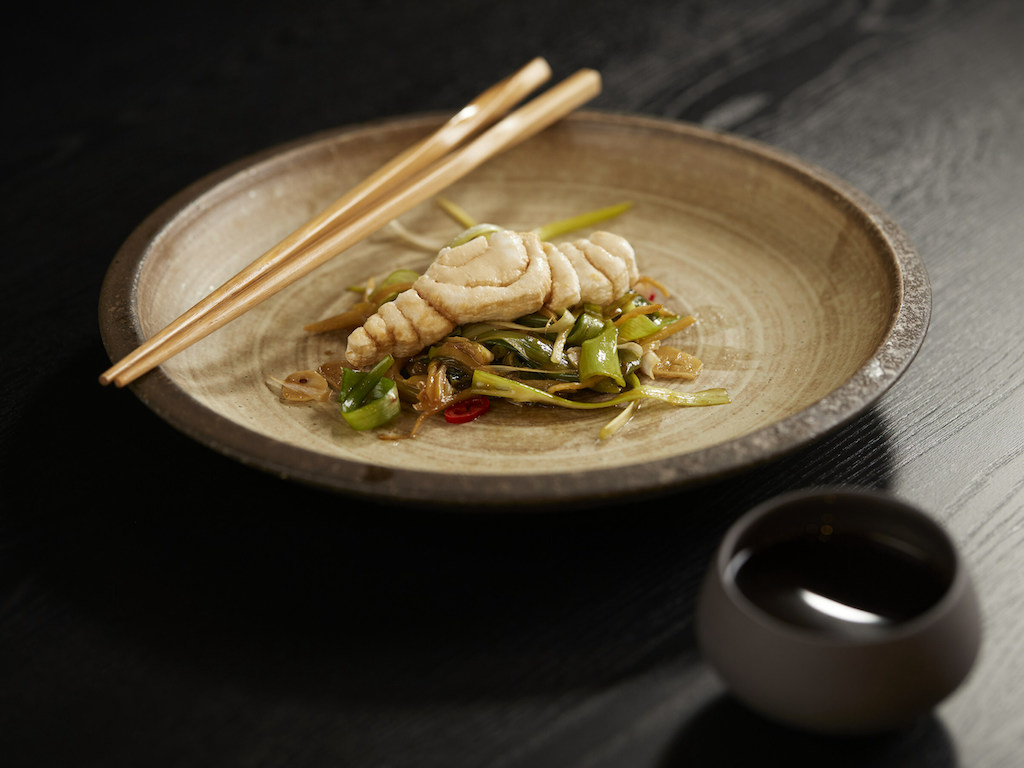Steakholder Foods and Umami Meats Debut World’s First 3D-Printed Cultivated Grouper Fish
3 Mins Read
In a global first, Israel’s Steakholder Fodos and Singapore’s Umami Meats showcase a 3-D printed grouper fish created using cellular agriculture.
Steakholder Foods, a Nasdaq-listed company and a leader in the cultivated meat industry based in Israel, has successfully printed the world’s first ready-to-cook cultivated grouper fish product. The firm achieved this breakthrough by customizing its bio-inks using grouper cells provided by Singaporean startup Umami Meats, with which Steakholder initiated a strategic partnership last year.
The company says this achievement is a significant milestone in the development of Steakholder’s 3D printer and bioink technology as a production platform for structured hybrid and cultivated products that can cater to various species and industry players.
Steakholder Foods’ collaboration with Umami Meats, which is backed by a grant from the Singapore-Israel Industrial R&D Foundation, aims to develop a scalable process for producing structured cultivated fish products using Steakholder Foods’ 3D bio-printing technology and customized bio-inks.
To celebrate this achievement, the company hosted a tasting event, including a “grouper fish chef’s table,” which featured Singaporean-style and Israeli-style signature fish dishes prepared by the company’s chef, Moran Lidor. The event was attended by Mihir Pershad, CEO of Umami Meats; Arik Kaufman, CEO of Steakholder Foods; Megumi Avigail Yoshitomi, Japan Association for Cellular Agriculture, and Adele Li, Chargée d’ Affaires at the Embassy of the Republic of Singapore in Israel.
Israeli Prime Minister Benjamin Netanyahu also attended the event, tasted the prototype, and watched the fish being printed firsthand. He became the first Prime Minister ever to taste 3D-printed cultivated fish, echoing last year’s Alpeh Farm tasting, when he was the first prime minister to eat cultivated beef steak.
Unlike fully cultivated meat products, which still require incubation and maturation after printing, the grouper fish product is ready to cook after printing, thanks to Steakholder Foods’ unique technology that allows the mimicking of the flaky texture of cooked fish – a technology that is the subject of a provisional patent application.
“We’re excited to be working with Umami Meats to develop 3D-printed structured fish products that have the same great taste and texture as traditionally caught fish, without harming the environment. With an estimated size of $110 billion and projected growth of 3-4% annually in the near future, the seafood and fish market is a long-time part of our vision for introducing sustainable solutions that increase food security. Having created a customized bio-ink that works effectively with Umami’s cells and optimized the taste and texture to meet the high standards of consumers, we anticipate expanding our collaborations to a greater variety of species with additional partners,” said Kaufman in a statement.
Umami’s Pershad added: “We are delighted to have produced the world’s first whole fillet cultivated fish in partnership with Steakholder Foods. In this first tasting, we showcased a cultivated product that flakes, tastes, and melts in your mouth exactly like excellent fish should. In the coming months, we intend to announce our plans for bringing this world-class cultivated fish to the market.”
Steakholder Foods, formerly known as MeaTech 3D Ltd., is developing a slaughter-free solution for producing a variety of beef and seafood products as an alternative to industrialized farming and fishing. The company says its mission is to support key issues underlined in the United Nations Sustainable Development Goals (SDGs), including strengthening food security, decreasing carbon footprint, and conserving water and land resources.
Umami Meats is cultivating a sustainable seafood future by producing delicious, nutritious, affordable cultivated seafood that is better for our health, oceans, and future. Umami Meats’ cultivated, not-caught seafood offers equivalent nutrition to traditional seafood and provides a delicious culinary experience free from heavy metals, antibiotics, and microplastics.
The company has been recognized as a semi-finalist in the XPRIZE Feed the Next Billion competition, a finalist in the Fi Global Startup Innovation Challenge, a member of Forward Fooding’s 2021 FoodTech 500 list, and as the Best Emerging Sustainable Seafood Company – Southeast Asia in the 2021 Global Green Business Awards.
Both Singapore and Israel are two of the most active alternative protein ecosystems globally, with proactive government support and strong scientific talent pools as key differentiators.




